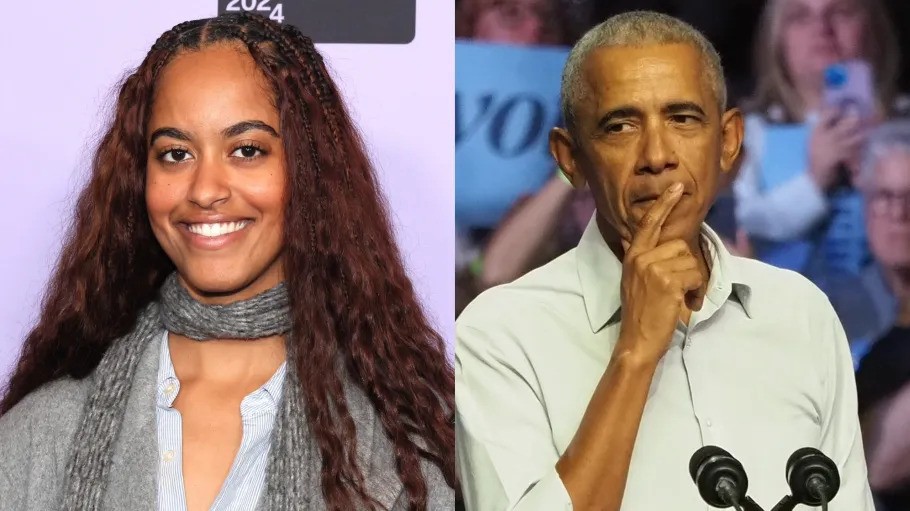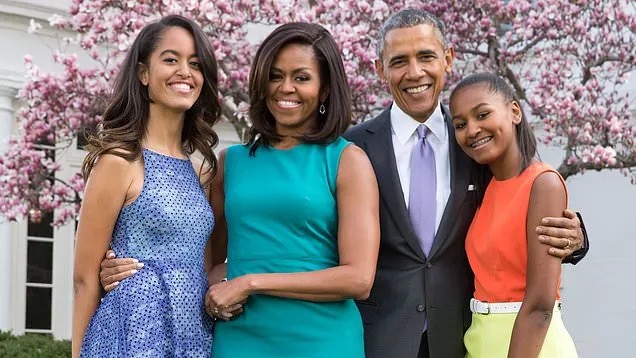By all accounts, Malia Obama had anything but an ordinary childhood. From the age of ten, she lived under the intense glare of the global spotlight as the eldest daughter of President Barack Obama and First Lady Michelle Obama. Raised in the political and cultural epicenter of the United States, she spent formative years in the White House, where family dinners were as likely to be interrupted by Secret Service briefings as by teen angst. But in recent months, Malia has taken a bold and symbolic step in reclaiming her own identity—by dropping her famous last name in her creative work.
Earlier this year, at the prestigious Sundance Film Festival, a short film titled The Heart debuted to quiet intrigue and critical curiosity. Written and directed by “Malia Ann,” the project quickly made headlines—not just for its artistic merit, but for the identity of its creator. Malia Ann is none other than Malia Obama, the daughter of the 44th President of the United States. Her decision to go by her first and middle names for the film’s credits was a deliberate act, sparking conversation about fame, identity, and what it means to step out from the shadow of a globally recognized surname.
In a recent appearance on the Sibling Revelry podcast, hosted by actors and fellow celebrity children Oliver and Kate Hudson, Michelle Obama opened up about her daughter’s decision. Joined by her own brother, Craig Robinson—who co-hosts the In My Opinion (IMO) podcast with her—Michelle spoke candidly about parenting in the public eye, letting go, and respecting her daughters’ journeys toward adulthood and self-definition.
Michelle recounted the moment the family learned Malia would be using only her first and middle names professionally. “She took off her last name, and we were like, they’re still going to know it’s you, Malia,” she laughed. “But we respected the fact that she’s trying to make her way.”
And that, in essence, is what this choice is about—making her own way. Malia Obama, now 25, is not a teenager playing dress-up in Hollywood. She’s a Harvard-educated woman, navigating one of the most cutthroat creative industries in the world. She’s interned on the set of HBO’s Girls, worked in the writers’ room of Donald Glover’s Swarm, and now, with The Heart, has taken the first major leap into authorship—telling her own stories in her own voice.
To some, the name change might seem like a cosmetic tweak, but it’s deeply symbolic. It’s about agency. It’s about saying, “I am not defined solely by where I come from. I have stories to tell that are not bound by politics or presidency.”
For Michelle Obama, watching her daughters navigate adulthood has been both rewarding and, at times, heart-wrenching. “Our daughters are 25 and 23. They are young adult women,” she said during the podcast. “But they definitely went through a period in their teen years where it was the push away… They’re still doing that.”

This phase—universally familiar to parents—is magnified tenfold when the children involved have spent their adolescence being photographed, scrutinized, and held to impossibly high standards. While most young adults go through a process of individuation in relative privacy, Malia and her younger sister Sasha have had to fight for their right to be seen as their own people.
“It is very important for my kids to feel like they’ve earned what they are getting in the world,” Michelle said. “They don’t want people to assume that they don’t work hard, that they’re just handed things. They’re very sensitive to that—they want to be their own people.”
In many ways, that sensitivity speaks volumes about how Malia and Sasha were raised. Far from cultivating an image of royal heirs to a political dynasty, the Obamas were intentional in instilling humility and a strong work ethic in their daughters. Despite the trappings of life in the White House—jets, motorcades, state dinners—Michelle and Barack made it a point to keep their girls grounded.
The public saw glimpses of Malia and Sasha as they grew up—from their first day at Sidwell Friends School to their appearances alongside their parents at national events. But behind the scenes, their parents fought hard to protect their sense of normalcy. Michelle recalls pushing for routines: homework, chores, and curfews—yes, even in the White House.
But normalcy is relative when your adolescence plays out on the national stage. Every outfit is analyzed, every romantic rumor dissected, every internship scrutinized. It’s no wonder that Malia would seek some creative distance—especially as she transitions into a professional space where merit should speak louder than legacy.
Malia’s decision to drop “Obama” from her film credit is, perhaps, an effort to sidestep the assumptions that come with her surname. In an industry notorious for both nepotism and the skepticism it brings, she appears to be saying: “Judge the work, not the name.”
The conversation on Sibling Revelry was especially poignant because the hosts, Oliver and Kate Hudson, could relate. As the children of actress Goldie Hawn and musician Bill Hudson (with actor Kurt Russell as a father figure), they know a thing or two about growing up in the shadow of famous parents.
“You guys know this as the children of parents who are known,” Michelle acknowledged. “It’s not easy. You want your own identity.”
Craig Robinson, too, chimed in with insights from the perspective of the lesser-known sibling of a world-famous figure. Together, the group delved into the often unseen emotional labor of famous families—how children of public figures navigate their way through preconceived notions, external expectations, and internal doubts.
“It’s hard enough to grow up,” Michelle said. “Add the spotlight, and everything gets magnified.”
Michelle Obama, who built an entire bestselling memoir (Becoming) around themes of growth and transformation, was candid about how she’s learned to evolve as a mother. She admitted that parenting adult children means embracing a new role—one that involves letting go, even when it’s scary.
“They wanted to push the envelope; they needed some rope,” she said of Malia and Sasha. “They wanted to try some things, they wanted to be out in the world, and I knew that under the circumstances, they needed more rope than I probably would’ve given them if I were my mom.”
This statement echoes a broader truth about parenting in the 21st century—particularly for those parenting within the glare of public life. It’s about finding the balance between protection and empowerment. For Michelle, that meant letting Malia move to Los Angeles and explore a notoriously tough industry, even if it meant watching from afar.
And so, Malia Ann stepped into the world—not as “Malia Obama, daughter of the president,” but as a storyteller in her own right.

Malia’s journey is part of a larger evolution within the Obama family. Sasha, a University of Southern California alum, has also kept a relatively low profile, choosing to quietly build a life away from the national spotlight. According to Michelle, both daughters are intentional about how they present themselves to the world, careful not to ride the coattails of fame but rather to chart their own courses.
This isn’t to say they’re rejecting their family name or what it represents. Rather, they’re demonstrating a different kind of pride—one that manifests in independence, resilience, and the pursuit of personal authenticity.
What Malia is doing mirrors what many second-generation public figures have attempted—to redefine legacy not as something inherited, but as something built. And by taking the leap with The Heart, she’s begun the slow, deliberate work of shaping her own narrative.
Only time will tell how Malia Ann’s creative career unfolds. The film world is unpredictable, and success is never guaranteed, even with talent and resources. But what’s clear is that Malia isn’t looking for shortcuts. She’s earning her place the hard way—through the work, not the name.
Her quiet determination, her willingness to take risks, and her conscious choice to step away from her inherited identity all suggest a young woman deeply committed to authenticity. If The Heart is any indication, Malia has something to say—and she’s going to say it in her own words.
In an age when fame is often a commodity passed down like a family heirloom, Malia Obama’s decision to professionally go by Malia Ann stands out. It’s a reminder that even the most well-known names come with their own burdens, and that identity—true identity—is something earned, not assumed.
Michelle Obama’s reflections offer a poignant backdrop to this unfolding story. She’s proud, supportive, and—perhaps most importantly—willing to step aside and let her daughter lead. “We respected the fact that she’s trying to make her way,” she said simply.
And now, the world watches as Malia Ann does just that.










